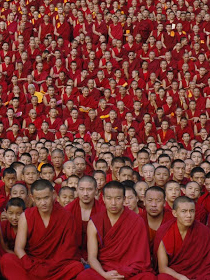- Home
- FPMT Homepage

Foundation for the Preservation of the Mahayana Tradition
The FPMT is an organization devoted to preserving and spreading Mahayana Buddhism worldwide by creating opportunities to listen, reflect, meditate, practice and actualize the unmistaken teachings of the Buddha and based on that experience spreading the Dharma to sentient beings. We provide integrated education through which people’s minds and hearts can be transformed into their highest potential for the benefit of others, inspired by an attitude of universal responsibility and service. We are committed to creating harmonious environments and helping all beings develop their full potential of infinite wisdom and compassion. Our organization is based on the Buddhist tradition of Lama Tsongkhapa of Tibet as taught to us by our founders Lama Thubten Yeshe and Lama Thubten Zopa Rinpoche.
- Willkommen
Die Stiftung zur Erhaltung der Mahayana Tradition (FPMT) ist eine Organisation, die sich weltweit für die Erhaltung und Verbreitung des Mahayana-Buddhismus einsetzt, indem sie Möglichkeiten schafft, den makellosen Lehren des Buddha zuzuhören, über sie zur reflektieren und zu meditieren und auf der Grundlage dieser Erfahrung das Dharma unter den Lebewesen zu verbreiten.
Wir bieten integrierte Schulungswege an, durch denen der Geist und das Herz der Menschen in ihr höchstes Potential verwandelt werden zum Wohl der anderen – inspiriert durch eine Haltung der universellen Verantwortung und dem Wunsch zu dienen. Wir haben uns verpflichtet, harmonische Umgebungen zu schaffen und allen Wesen zu helfen, ihr volles Potenzial unendlicher Weisheit und grenzenlosen Mitgefühls zu verwirklichen.
Unsere Organisation basiert auf der buddhistischen Tradition von Lama Tsongkhapa von Tibet, so wie sie uns von unseren Gründern Lama Thubten Yeshe und Lama Thubten Zopa Rinpoche gelehrt wird.
- Bienvenidos
La Fundación para la preservación de la tradición Mahayana (FPMT) es una organización que se dedica a preservar y difundir el budismo Mahayana en todo el mundo, creando oportunidades para escuchar, reflexionar, meditar, practicar y actualizar las enseñanzas inconfundibles de Buda y en base a esa experiencia difundir el Dharma a los seres.
Proporcionamos una educación integrada a través de la cual las mentes y los corazones de las personas se pueden transformar en su mayor potencial para el beneficio de los demás, inspirados por una actitud de responsabilidad y servicio universales. Estamos comprometidos a crear ambientes armoniosos y ayudar a todos los seres a desarrollar todo su potencial de infinita sabiduría y compasión.
Nuestra organización se basa en la tradición budista de Lama Tsongkhapa del Tíbet como nos lo enseñaron nuestros fundadores Lama Thubten Yeshe y Lama Zopa Rinpoche.
A continuación puede ver una lista de los centros y sus páginas web en su lengua preferida.
- Bienvenue
L’organisation de la FPMT a pour vocation la préservation et la diffusion du bouddhisme du mahayana dans le monde entier. Elle offre l’opportunité d’écouter, de réfléchir, de méditer, de pratiquer et de réaliser les enseignements excellents du Bouddha, pour ensuite transmettre le Dharma à tous les êtres. Nous proposons une formation intégrée grâce à laquelle le cœur et l’esprit de chacun peuvent accomplir leur potentiel le plus élevé pour le bien d’autrui, inspirés par le sens du service et une responsabilité universelle. Nous nous engageons à créer un environnement harmonieux et à aider tous les êtres à épanouir leur potentiel illimité de compassion et de sagesse. Notre organisation s’appuie sur la tradition guéloukpa de Lama Tsongkhapa du Tibet, telle qu’elle a été enseignée par nos fondateurs Lama Thoubtèn Yéshé et Lama Zopa Rinpoché.
Visitez le site de notre Editions Mahayana pour les traductions, conseils et nouvelles du Bureau international en français.
Voici une liste de centres et de leurs sites dans votre langue préférée
- Benvenuto
L’FPMT è un organizzazione il cui scopo è preservare e diffondere il Buddhismo Mahayana nel mondo, creando occasioni di ascolto, riflessione, meditazione e pratica dei perfetti insegnamenti del Buddha, al fine di attualizzare e diffondere il Dharma fra tutti gli esseri senzienti.
Offriamo un’educazione integrata, che può trasformare la mente e i cuori delle persone nel loro massimo potenziale, per il beneficio di tutti gli esseri, ispirati da un’attitudine di responsabilità universale e di servizio.
Il nostro obiettivo è quello di creare contesti armoniosi e aiutare tutti gli esseri a sviluppare in modo completo le proprie potenzialità di infinita saggezza e compassione.
La nostra organizzazione si basa sulla tradizione buddhista di Lama Tsongkhapa del Tibet, così come ci è stata insegnata dai nostri fondatori Lama Thubten Yeshe e Lama Zopa Rinpoche.
Di seguito potete trovare un elenco dei centri e dei loro siti nella lingua da voi prescelta.
- 欢迎 / 歡迎
简体中文
“护持大乘法脉基金会”( 英文简称:FPMT。全名:Foundation for the Preservation of the Mahayana Tradition) 是一个致力于护持和弘扬大乘佛法的国际佛教组织。我们提供听闻,思维,禅修,修行和实证佛陀无误教法的机会,以便让一切众生都能够享受佛法的指引和滋润。
我们全力创造和谐融洽的环境, 为人们提供解行并重的完整佛法教育,以便启发内在的环宇悲心及责任心,并开发内心所蕴藏的巨大潜能 — 无限的智慧与悲心 — 以便利益和服务一切有情。
FPMT的创办人是图腾耶喜喇嘛和喇嘛梭巴仁波切。我们所修习的是由两位上师所教导的,西藏喀巴大师的佛法传承。
繁體中文
護持大乘法脈基金會”( 英文簡稱:FPMT。全名:Found
ation for the Preservation of the Mahayana Tradition ) 是一個致力於護持和弘揚大乘佛法的國際佛教組織。我們提供聽聞, 思維,禪修,修行和實證佛陀無誤教法的機會,以便讓一切眾生都能 夠享受佛法的指引和滋潤。 我們全力創造和諧融洽的環境,
為人們提供解行並重的完整佛法教育,以便啟發內在的環宇悲心及責 任心,並開發內心所蘊藏的巨大潛能 — 無限的智慧與悲心 – – 以便利益和服務一切有情。 FPMT的創辦人是圖騰耶喜喇嘛和喇嘛梭巴仁波切。
我們所修習的是由兩位上師所教導的,西藏喀巴大師的佛法傳承。 察看道场信息:
- FPMT Homepage
- News/Media
-
- Study & Practice
-
-
- About FPMT Education Services
- Latest News
- Programs
- New to Buddhism?
- Buddhist Mind Science: Activating Your Potential
- Heart Advice for Death and Dying
- Discovering Buddhism
- Living in the Path
- Exploring Buddhism
- FPMT Basic Program
- FPMT Masters Program
- FPMT In-Depth Meditation Training
- Maitripa College
- Lotsawa Rinchen Zangpo Translator Program
- Universal Education for Compassion & Wisdom
- Online Learning Center
-
- Prayers & Practice Materials
- Overview of Prayers & Practices
- Full Catalogue of Prayers & Practice Materials
- Explore Popular Topics
- Benefiting Animals
- Chenrezig Resources
- Death & Dying Resources
- Lama Chopa (Guru Puja)
- Lama Zopa Rinpoche: Compendium of Precious Instructions
- Lama Zopa Rinpoche: Life Practice Advice
- Lama Zopa Rinpoche Practice Series
- Lamrim Resources
- Mantras
- Prayer Book Updates
- Purification Practices
- Sutras
- Thought Transformation (Lojong)
- Audio Materials
- Dharma Dates - Tibetan Calendar
- Translation Services
- Publishing Services
- Ways to Offer Support
- Prayers & Practice Materials
-
- Teachings and Advice
- Find Teachings and Advice
- Lama Zopa Rinpoche Advice Page
- Lama Zopa Rinpoche: Compendium of Precious Instructions
- Lama Zopa Rinpoche Video Teachings
- ༧སྐྱབས་རྗེ་བཟོད་པ་རིན་པོ་ཆེ་མཆོག་ནས་སྩལ་བའི་བཀའ་སློབ་བརྙན་འཕྲིན།
- Podcasts
- Lama Yeshe Wisdom Archive
- Buddhism FAQ
- Dharma for Young People
- Resources on Holy Objects
- Teachings and Advice
-
-
*If a menu item has a submenu clicking once will expand the menu clicking twice will open the page.
-
-
- Centers
-
- Teachers
-
- Projects
-
-
-
-
*If a menu item has a submenu clicking once will expand the menu clicking twice will open the page.
-
-
- FPMT
-
- Shop
-
-
-
The Foundation Store is FPMT’s online shop and features a vast selection of Buddhist study and practice materials written or recommended by our lineage gurus. These items include homestudy programs, prayers and practices in PDF or eBook format, materials for children, and other resources to support practitioners.
Items displayed in the shop are made available for Dharma practice and educational purposes, and never for the purpose of profiting from their sale. Please read FPMT Foundation Store Policy Regarding Dharma Items for more information.
-
-
27
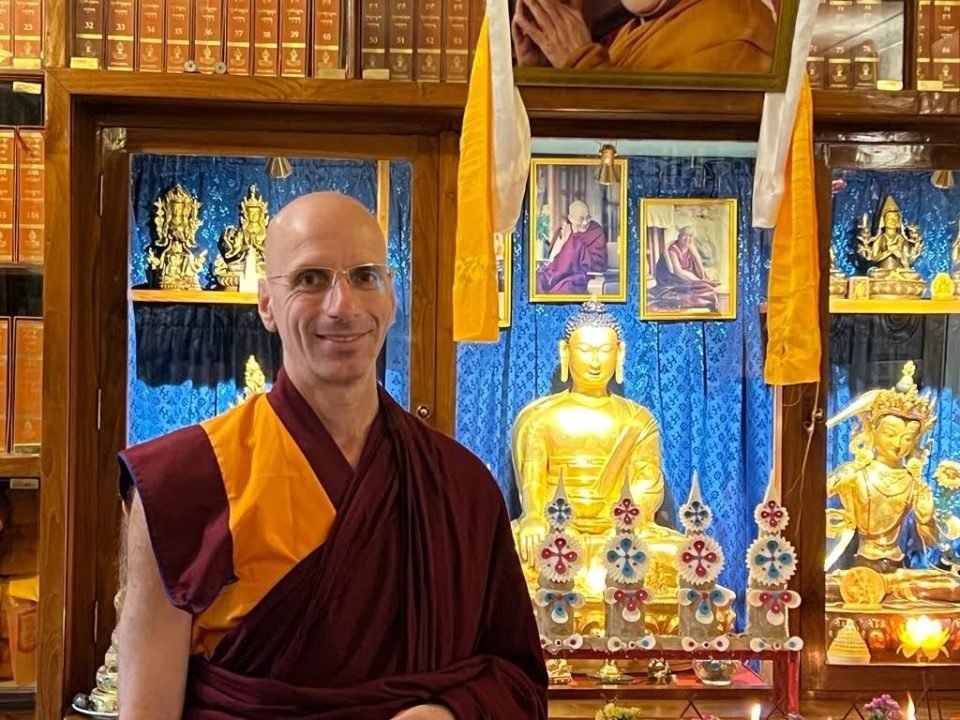
Geshe Tenzin Legtsok at Sera IMI House, Sera Monastery, India. Photo courtesy of Geshe Tenzin Legtsok.
Ordained by His Holiness the Dalai Lama in 2001, Geshe Tenzin Legtsok is an American Buddhist monk who just completed the Geshe Studies Program at Sera Je Monastic University in Karnataka, South India. This means he has studied the five classic Indian Buddhist treatise from the Ornament for Clear Realizations by Maitreya Buddha to the Vinaysutra by Gunaprabha and their Tibetan commentaries in the tradition of ancient Nalanda University.
Geshe Legtsok is the first US citizen and first Western monk from Kopan Monastery to receive the geshe degree from Sera Je Monastery; joining several other Westerners and non-Tibetan/Himalayan monks to receive geshe degrees before him. This is an auspicious result of mutual appreciation between two distinct cultures that didn’t have much interface before. As Geshe Legtsok notes, “In the past fifty years the Tibetan monastic community has become much more open and supportive of non-Tibetans studying in their midst and now point to them with pride. Also, interest in the Tibetan lineages of Buddhism has grown steadily during that time.”
Born in Virginia, US, in 1973, he obtained a Bachelor of Arts from Kenyon College in 1995. Asking himself the question, “What makes for the most happy and meaningful life?” compelled him to major in philosophy during college and gradually led him to study meditation and philosophy with teachers among the exiled Tibetan communities in India and Nepal from 1999 until the present.
In a recent interview, Geshe Legtsok shared:
Until about five years ago I was never really concerned with attaining the geshe degree. My interest was always just to learn and practice in the way the geshe program affords. When I was a new monk, I just wanted to meditate and wasn’t very inclined to study Buddhist philosophical topics. But as I learned more about the lamrim and lojong teachings it gradually dawned on me that if I wanted to actually develop realizations on the path to enlightenment like the past saints of ancient Nalanda University, Nagarjuna, Shantideva, Chandrakirti, and others, then I had to study the texts they’ve composed detailing the path they had practiced. Also, I figured, if I wanted to become like my own teachers, His Holiness the Dalai Lama, Kyabje Lama Zopa Rinpoche, Khensur Lama Lhundrup, and so forth, then I would have to study and practice as they have. This drew me into the geshe program. My own natural curiosity and experience of benefit from studying sustained me from year to year. About five years ago I was ready to leave the program and dedicate more time to retreat, written translation, and service. At that time Lama Zopa Rinpoche advised that it would be more beneficial to finish the entire program and attain the geshe degree, so I continued on until the end.
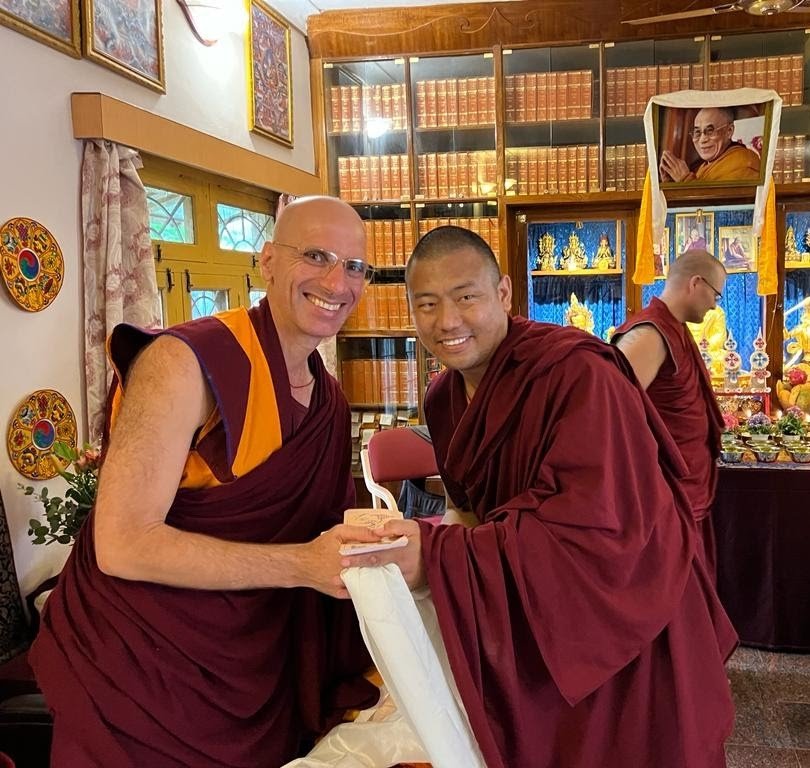
Geshe Legtsok receiving khatas and gifts from classmates and friends on July 13, the day after completion of the graduation ceremonies.
Nineteen years ago Geshe Legtsok joined the Kopan House at Sera Monastery. which is a large community of sixty monks who are all from Kopan Monastery. Since the former abbot of Kopan Monastery Lama Lhundrup (1941-2011), was Geshe Legtsok’s main teacher at the time he joined Sera, he joined Sera Kopan House and became part of Kopan Monastery. He stayed at Kopan House for the first four years at Sera, but due to his belief that Western monastics should support one another in the program at Sera, he moved into Sera IMI House which was founded by Western FPMT monks at Sera for that purpose. He remained in that community throughout the subsequent years of his study and also remained part of Sera Kopan House participating in functions and upholding responsibilities there.
Geshe Legtsok explains the meaning of the term “geshe” in the following way:
Many people think “geshe” means you are a Buddhist scholar whereas that is not the case. Literally “geshe” means “virtuous friend” and was a term that, in former times, Tibetans organically came to use for a person whom they felt embodied the qualities of a worthy spiritual teacher. This was the case with the Kadampa Geshes for example, similar to the way Lama Yeshe came to be called “lama.” There was no formal procedure by which one received the title geshe then. More recently, the Gelug monasteries have created formal criteria by which a monk is awarded the title geshe; the main criteria is that the candidate follows the discipline of the monastery for a certain number of years, from twenty to twenty-five depending on the monastery. One may study or one may serve the monastery doing various kinds of work during that time, as is the case with many geshes.
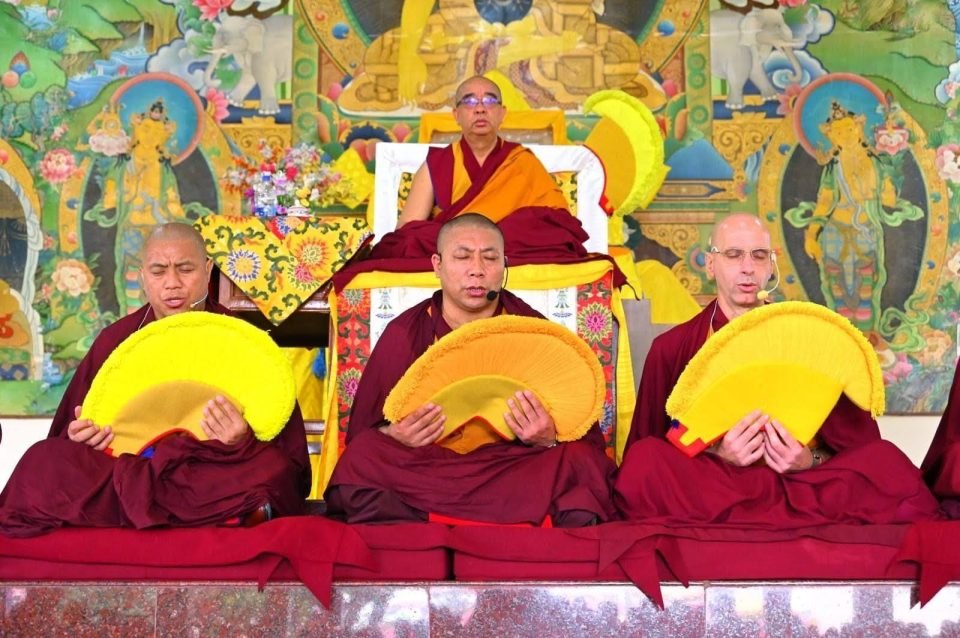
Geshe Tenzin Legtsok (far right) reciting a thesis on the five great treatises during the debate examination. Photo courtesy of Geshe Legtsok.
There are several different ceremonies associated with one receiving the geshe degree. One is a public debate examination during which the geshe candidate recites a text from memory in front of the monks still in the study program, and then answers in response to various debates. The other main ceremony is a “thanks offering” which the new geshe makes to the entire community of monks.
On the day of Geshe Legtsok’s main ceremonies there were two other monks becoming geshes. The three of them together offered breakfast, lunch, and dinner, and they each offered twenty rupees to each monk in the monastery. This is according to the monastery rules in order to keep the expense reasonable. The spirit of the offering is to thank the entire community for the training and support they have provided during the program, and, as Geshe Legtsok explained, “to create roots of merit to bring success in one’s practice and activities serving sentient beings going forward.” One also makes offerings to the smaller communities within the monastery of which one is a member. As a member of Tsawa Khangtsen, Sera Kopan House, Sera IMI House, and Kopan Monastery and Nunnery, Geshe Legtsok made offerings of a meal and monetary offering to each member of those communities as well, which, as Geshe Legtsok explains “was possible due to gifts from many generous friends and family members.”
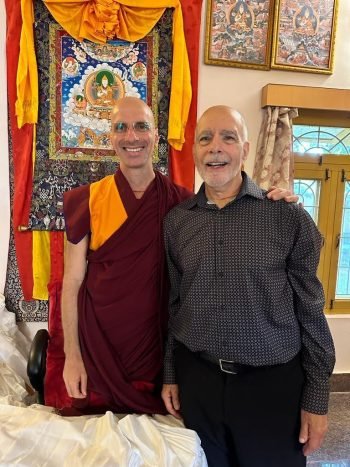
Geshe Legtsok with his father during the khata offering day following the graduation ceremony.
When asked what the geshe degree means to him personally and professionally, Geshe Legtsok explained:
It’s hard to say what the geshe degree will mean professionally. Helping to make Buddha’s teachings available to others is not something in which you should be seeking fame and career advancement. Had I not received the geshe degree, similar opportunities for teaching and translation would probably still arise. But having the title is a succinct way to reference the training program I’ve completed and denotes an official seal of approval. Personally, the most important thing is to have fulfilled Lama Zopa Rinpoche’s wish that I receive the degree. If Rinpoche had advised me not take the geshe degree then to follow that advice would have been most meaningful. Also, it’s rewarding to know that my other teachers are pleased that I’ve finished the entire program and achieved official recognition of that. My classmates, family, and many others in the Buddhist world have expressed joy that I’ve been awarded this honor. It’s good to bring them a little happiness. Perhaps it also shows others that there is this life path available.
Although in one way completing the geshe program is a culmination of years of study and contemplation, more importantly it is a beginning of the real work to deepen one’s practice through meditation and serving the Dharma and sentient beings. I think that would be the best way to repay the infinite kindness of my spiritual teachers, friends, and family who have provided so much support in reaching this small milestone. If I have a few more years in this precious human rebirth to spend in this way I’ll be most grateful.
The entire FPMT community rejoices at Geshe Legtsok’s achievement and offers him every success imaginable!
Foundation for the Preservation of Mahayana Tradition (FPMT), is a Tibetan Buddhist organization dedicated to the transmission of the Mahayana Buddhist tradition and values worldwide through teaching, meditation and community service.
- Tagged: geshe studies, sera monastery, ven. tenzin legtsok
- Home
- News/Media
- Study & Practice
- About FPMT Education Services
- Latest News
- Programs
- New to Buddhism?
- Buddhist Mind Science: Activating Your Potential
- Heart Advice for Death and Dying
- Discovering Buddhism
- Living in the Path
- Exploring Buddhism
- FPMT Basic Program
- FPMT Masters Program
- FPMT In-Depth Meditation Training
- Maitripa College
- Lotsawa Rinchen Zangpo Translator Program
- Universal Education for Compassion & Wisdom
- Online Learning Center
- Prayers & Practice Materials
- Overview of Prayers & Practices
- Full Catalogue of Prayers & Practice Materials
- Explore Popular Topics
- Benefiting Animals
- Chenrezig Resources
- Death & Dying Resources
- Lama Chopa (Guru Puja)
- Lama Zopa Rinpoche: Compendium of Precious Instructions
- Lama Zopa Rinpoche: Life Practice Advice
- Lama Zopa Rinpoche Practice Series
- Lamrim Resources
- Mantras
- Prayer Book Updates
- Purification Practices
- Sutras
- Thought Transformation (Lojong)
- Audio Materials
- Dharma Dates – Tibetan Calendar
- Translation Services
- Publishing Services
- Teachings and Advice
- Find Teachings and Advice
- Lama Zopa Rinpoche Advice Page
- Lama Zopa Rinpoche: Compendium of Precious Instructions
- Lama Zopa Rinpoche Video Teachings
- ༧སྐྱབས་རྗེ་བཟོད་པ་རིན་པོ་ཆེ་མཆོག་ནས་སྩལ་བའི་བཀའ་སློབ་བརྙན་འཕྲིན།
- Podcasts
- Lama Yeshe Wisdom Archive
- Buddhism FAQ
- Dharma for Young People
- Resources on Holy Objects
- Ways to Offer Support
- Centers
- Teachers
- Projects
- Charitable Projects
- Make a Donation
- Applying for Grants
- News about Projects
- Other Projects within FPMT
- Support International Office
- Projects Photo Galleries
- Give Where Most Needed
- FPMT
- Shop
Translate*
*powered by Google TranslateTranslation of pages on fpmt.org is performed by Google Translate, a third party service which FPMT has no control over. The service provides automated computer translations that are only an approximation of the websites' original content. The translations should not be considered exact and only used as a rough guide.Letting go of attachment brings inner satisfaction and peace.






